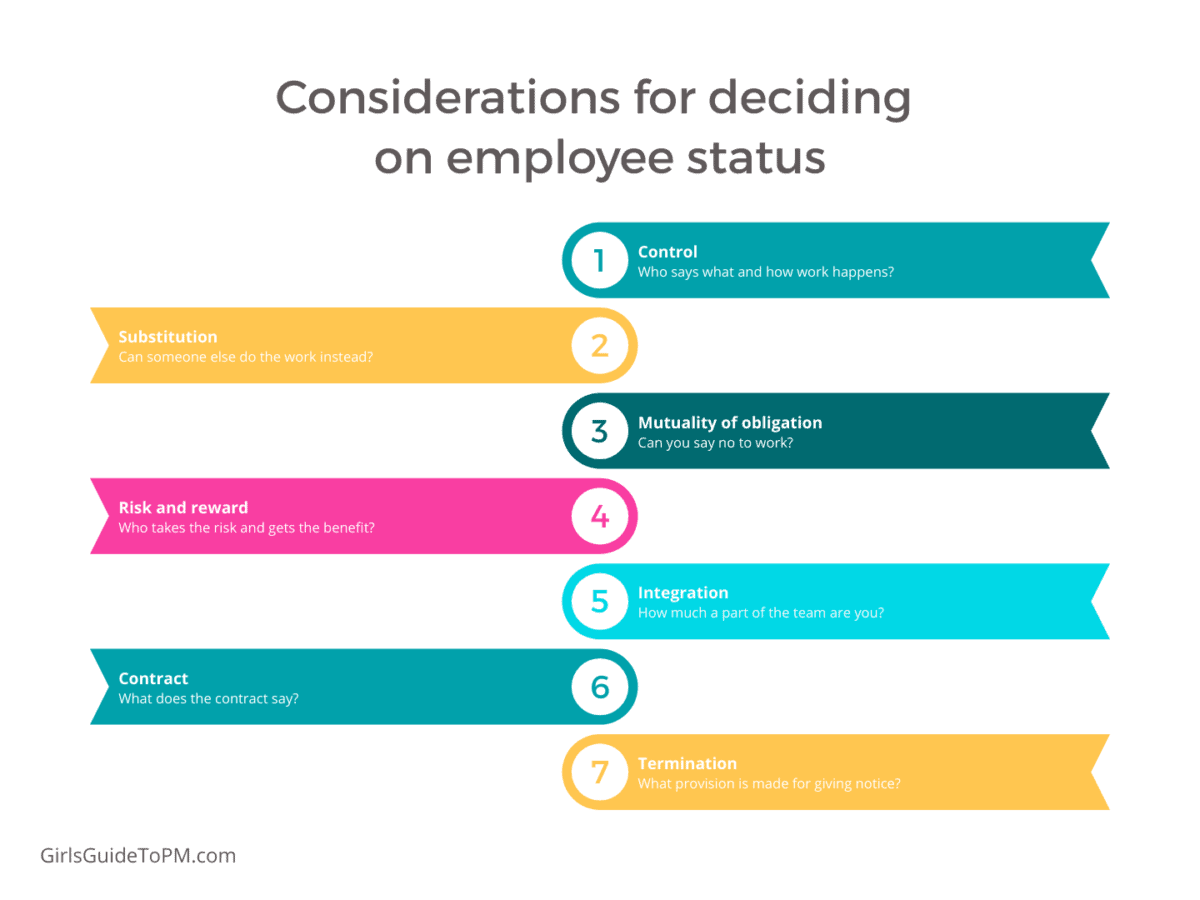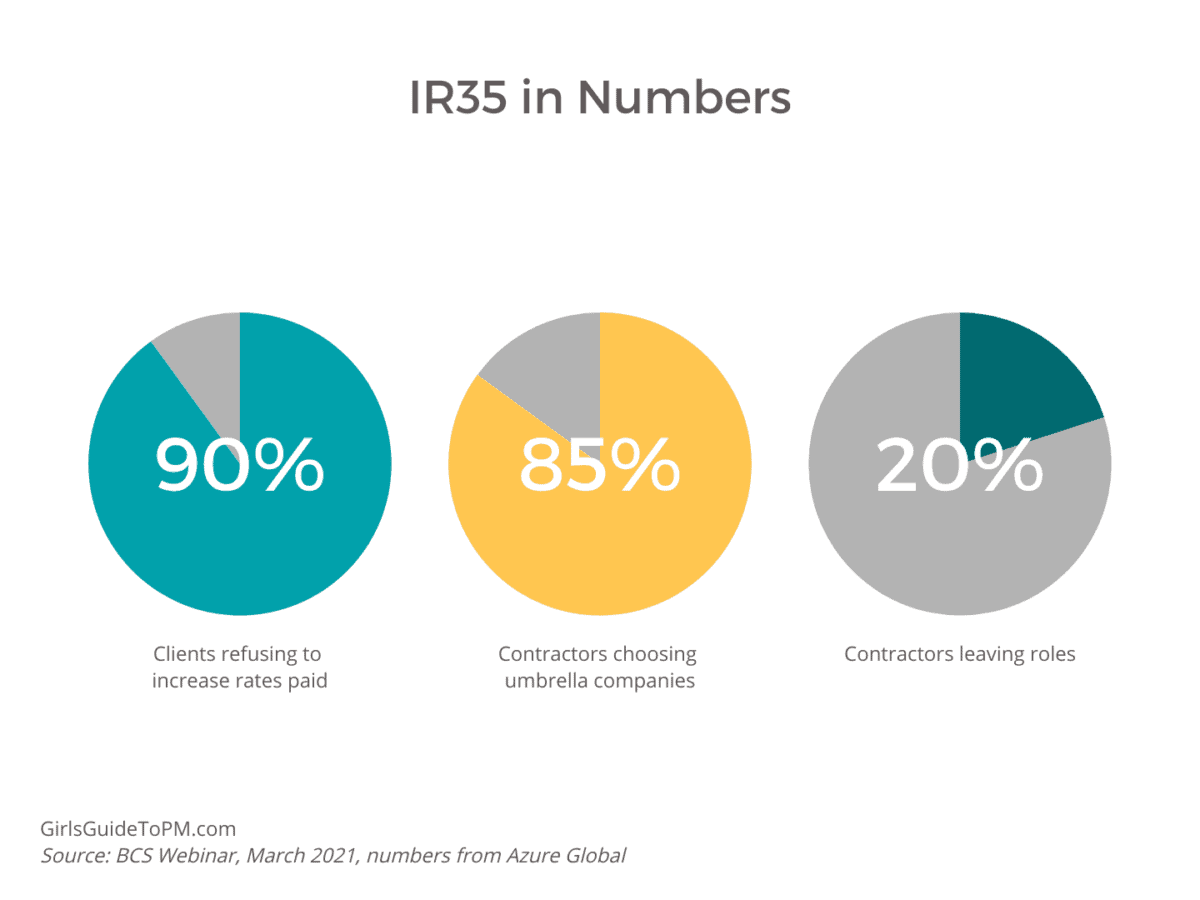IR35: The biggest shakeup in project management careers for a decade
What is IR35?
The IR35 we’re all talking about at the moment is off-payroll legislation.
It’s all about whether or not someone is considered an employee of the company, taking into account certain factors around employment status.
Why is IR35 happening?
Because there’s more tax to be had if employers acknowledge that certain contractors are ‘employees in disguise’.
“There’s a hole in the Treasury bucket,” said Dave Chaplin, CEO of IR35 Shield, in a webinar for BCS, The Chartered Institute for IT. There’s the perception that both contractors and employers benefit from the tax arrangements of having contract staff instead salaried employees.
The government anticipates raising an extra £3.1bn through the additional tax, although there’s no way particularly to measure it, according to Dave.
Why is it called IR35?
It stands for Inland Revenue Note 35.
What’s actually happening now is a new Chapter of the payroll legislation, which we’re calling IR35 as a shorthand but actually it’s the off-payroll legislation.
What makes someone an employee?
Dave explained that there isn’t any legal definition of what it means to be an employee as it’s all determined by case law. However, the determination about employment status does look at certain factors.
Marie Pegram, Partner and recruitment specialist at chartered accountants UHY Hacker Young, explained in the webinar that various things are taken into consideration when working out whether someone is an employee, including:
- Control: who controls what is done on the project, how it’s done and when it happens?
- Substitution: are you able to send someone else to do the work if you are unavailable? There might be a few situations where you could, but as a project manager there’s a lot of knowledge in your head that makes it hard to send in a substitute if you’re off sick for a week.
- Mutuality of obligation: are you able to reject certain assignments? This looks at how work is offered to you and what the process is for accepting it. Typically, employees can’t say no to tasks if it falls within their job remit.
- Risk and reward: who carries the risk of the task and who gets the benefit once it’s done?
- Integration: how much are you integrated into the organization? Do you get invites to the Christmas party and things like that?
- Contract: what does the contract say?
- Termination: what provision is made in the contract or expected in terms of giving notice on the contract?

When does IR35 come into effect?
IR35 has been around since 2000 so it’s not new.
The new off-payroll rules only apply to payments made for services on or after 6 April 2021, said Marie.
Who is affected?
The off-payroll legislation affects the following groups:
- Public sector employers (it’s applied to them for some time already, so this isn’t new)
- Private sector organizations that are medium and large companies, that meet 2 of these criteria: £10.2m turnover, £5.1m on the balance sheet, more than 50 employees*
- Or an organization that’s part of a medium or large group, that meets 2 of these criteria: £12.2m turnover, £6.1m on the balance sheet, more than 50 employees*
“If you’re a contractor providing services to a client via an intermediary such as a personal service company (even if that’s through an agency), it may be that your tax status will change once the new IR35 changes come into force,” says Claire Halle-Smith, Senior Associate at Wright Hassall.
“Your client will need to determine your tax status and provide you with a valid status determination statement. If deemed an employee, income tax and national insurance contributions will become payable, potentially by you, which could significantly reduce your income. “
But it’s even more complicated than that, according to Marie, in some supply chains. For example, you might work for an overseas client, hired by a UK recruitment company which hires your own personal service company and then there’s you.
Who is the fee payer in that situation?
Well, it pays (literally) to know the facts about whether you are supplying services or labour and who is considered the fee payer, because that group needs to do the determination about whether you fall into the off-payroll legislation or not.
What does IR35 mean for consultant project managers?
If you are inside IR35, you’ll probably lose money. Your take home pay from your own Limited company is likely to be higher than your take home pay as an employee or being paid as part of an umbrella company – unless you can get your fee payor (the agency or the end client) to pay more.
In the old system, the contractor had to do an assessment to make a decision about whether they were in or out of payroll legislation. In the new system, the client is responsible for making the determination about whether you fall into IR35 or not.
It basically means that you have to pay more tax.
Why not just charge more for your services to offset the tax?
You could try simply charging more for the work you do.
However, Chris Fahey, Sales Director at Azure Global, with 17 years in the payroll industry, said on the BCS webinar that of the 12 IT recruitment agencies he spoke to, 90% of end clients are refusing to increase their rates.
Recruitment agencies have a relatively narrow margin, so they can’t absorb the increased fees.
He said that 85% of contractors are choosing umbrella companies and 20% of contractors are leaving their roles, going permanent or to overseas roles, or simply stepping back from work totally.
Wow.
What does IR35 mean for projects employing consultants?
“The new law has already impacted on industry where some larger corporates have imposed blanket restrictions on the use of contractors, preferring to limit any risk by only engaging employees,” says Claire.
So you might be at risk of losing your consultants totally, if your company is taking the same approach. Under the new arrangements, clients have to do the assessment to determine whether or not the arrangement means the contractor is considered an employee.
The challenge is the project budget.
IR35 means the client has to pay more tax. They have to pay employers’ National Insurance on top of the day rate to the contractor. So how do you get round that?
The consultant’s day rate is renegotiated (not simply taken off, because that would be unlawful) down to allow the overall budget to remain the same, once employers’ NI is taken into account.
The contractor also has to pay more tax, so they’ll want to increase their rates to offset the additional tax – as we saw above.
Expenses are also affected: don’t forget to account for the cost of those if you are working out new charges for your project budget.

What’s the outlook for contractors in the UK?
“Many clients are converting contract roles to permanent positions to reduce the overhead of having to deal with a mixed resource estate but demand for skilled contract resource is set to continue,” says John Skelt, Director of Contractor Transition.
“Rates for in demand skills are likely to remain competitive and may even increase to retain key resources and offset the costs of effectively running as PAYE through an umbrella company.” John says that recent seismic events such as the coronavirus pandemic and Brexit are examples of change drivers that will generate contract opportunities, so the future isn’t all bad if you work as a contractor.
Next steps
“Existing and new contractors need to be clear on their options and what they will need to do to prepare for the policy implementation, yet to be finalised by Westminster,” says John. “All circumstances are unique and there are many factors that determine an individual’s status so now is the time to have conversations with clients, agencies and umbrella providers about how they intend to approach arrangements going forward.”
If you are a UK project manager with a project that employs contractors:
- Take advice from your HR team about the status of your project resources to make sure that assessments have been done – you might need to be involved in this to provide information about the individual’s working patterns and conditions
- Review your project budget with the finance team to take account of any additional resource costs
- Review your expense budget with the finance team and the contractor to see what impact that is going to have on your overall budget.
If you are a UK project manager working as a contractor:
- Make sure your client is prepared to do the assessment
- Would it be better if you were an employee? It’s an option…
- Do you still need your personal service company? Talk to your accountant about whether you need to keep it and whether it’s cost-effective to close it
- Review your insurance policy and make sure it still covers you
- Do the maths! Work out what the financial impact to you will be if the determination is that you are within the IR35 boundaries.
The bottom line is you need to understand the new rules and work out what action you need to take and what the legislation means for you (and your bank balance).
Note: This article does not constitute legal advice. If you fall into the scope of IR35, or you have project resources who are contractors, take professional advice so you can make the best, most informed decisions for you and your organization.
* Figures from Marie, BCS Webinar, 10 March 2021
Pin for later reading

